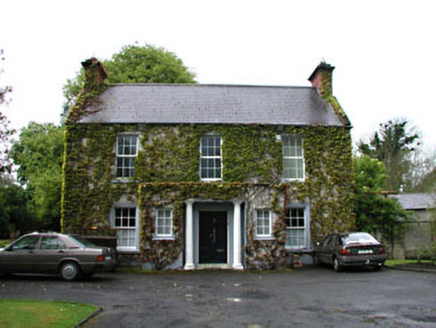Survey Data
Reg No
11900502
Rating
Regional
Categories of Special Interest
Architectural, Historical, Social
Original Use
Presbytery/parochial/curate's house
In Use As
House
Date
1850 - 1890
Coordinates
287042, 240537
Date Recorded
15/10/2002
Date Updated
--/--/--
Description
Detached three-bay two-storey former presbytery, c.1870, retaining some original fenestration with single-bay single-storey flat-roofed projecting porch to front. Reroofed and part refenestrated, c.1990. Now in private residential use. Gable-ended roof. Replacement artificial slate, c.1990. Concrete ridge tiles. Red brick chimney stacks. Concrete coping to gables. Cast0iron rainwater goods on eaves course. Flat-roofed to porch. Materials not visible. Roughcast walls. Painted??? Moulded rendered quoins to corners. Square-headed window openings. Stone sills. Original 6/6 timber sash windows to ground floor. Replacement uPVC casement windows, c.1990, to remainder. Square-headed door opening. Moulded rendered Doric doorcase with lintel over. Timber panelled double doors. Set back from road in own grounds. Landscaped grounds to site.
Appraisal
Boycetown Presbytery (former) is a fine, late nineteenth-century house of Classical proportions and symmetry that retains most of its original form and some of its original fabric and character. The front (east) elevation is expressed as an austere façade of reserved ornamentation, with the exception of the doorcase, which served to convey the authority of the church in the locality. Comprehensively renovated in the late twentieth century to accommodate a private use, important surviving original salient features include the early fenestration to ground floor – the re-instatement of traditional-style timber fenestration to the remainder, using these examples as a reference point, would restore a more accurate representation of the original appearance of the building. The presbytery is of considerable social and historic interest for its original intended purpose as the ecclesiastical residence for the Catholic clergy in the area, and remains a picturesque feature in the locality.

